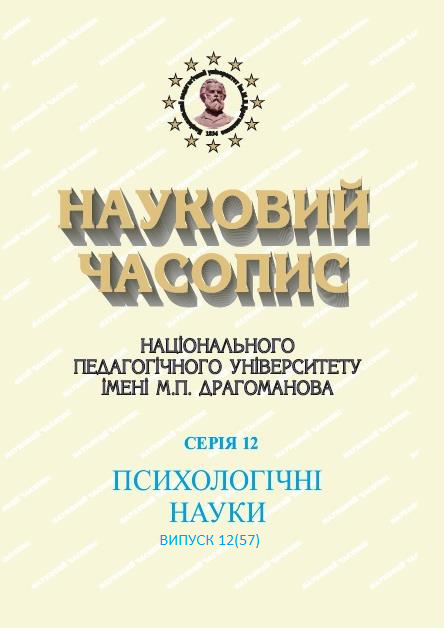СERTAIN ASPECTS OF DEVELOPING DIGITAL COMPETENCE FOR NON-FORMAL EDUCATION PROFESSIONALS WHEN TRANSITIONING INTO ONLINE MODЕ
DOI:
https://doi.org/10.31392/NPU-nc.series12.2020.12(57).01Keywords:
online, offline, digital tools, digital skills, non-formal education, non-formal education specialistAbstract
This article presents the results of an empirical study of the problem of transitioning vocational education into online mode during forced quarantine. The circumstances have sharply actualized the urgent need to ensure the continuity of educational activities in the new conditions, showed the real state of professional readiness of education specialists to work in conditions of uncertainty. The key sign of this state is a certain professional and psychological disorientation, which endangered the quality and sustainability of educational results. The formal and non-formal education specialists have been forced to adapt quickly to the new terms based on digital transformation. The focus of our research is on postgraduate education professionals. An important aspect of the research is a certain confusion about the essence of online learning. This applies to the misinterpretation of the definition of distance learning among the professionals, which does not distinguish between synchronous (real-time) and asynchronous (delayed) modes. Fundamental differences in using the methods and application techniques require special training of relevant specialists. The results of the presented research reveal a number of difficulties faced by postgraduate education specialists, when they are required to move their activities online. First of all, it is educational activities around professional development, training courses for adults. An important task for the specialists was to preserve the essential features and results of such training: information, tools and experiences that are available during offline training. The main result of the study is the definition of the key areas to train the specialists to work online: psychological readiness to manage group dynamics and limited communication tools, digital competence – possession of specific digital skills (platforms, programs, individual tools online), methodological competence – the ability to choose and combine methods and techniques to work with data adapted to the online environment.
References
- Vasylenko, O.V. (2014). Rozvytok systemy neformalnoi osvity doroslykh v umovakh sotsialno-ekonomichnoi kryzy. [Development of the system of non-formal adult education in the conditions of socio-economic crisis]. Aktualni problemy profesiinoi oriientatsii ta profesiinoho navchannia v umovakh sotsialno-ekonomichnoi nestabilnosti – Current problems of vocational guidance and vocational training in conditions of socio-economic instability, 2(2), 138–146 [in Ukrainian].
- Vashchenko, L.I. (2019). Pidhotovka fakhivtsiv dlia roboty z doroslymy u sferi neformalnoi osvity. [Training of specialists for work with adults in the field of non-formal education]. Imidzh suchasnoho pedahoha – The image of a modern teacher, 4(187), 24–27 [in Ukrainian].
- Korbut, O.H. (2017). Dystantsiine navchannia: modeli, tekhnolohii, perspektyvy. [Distance learning: models, technologies, perspectives]. Retrieved from http://confesp.fl.kpi.ua/ru/node/1123 [in Ukrainian].
- Plynokos, D.D., & Kovalenko, M.O. (2016). Neformalna osvita: teoretychni aspekty i naukovi pidkhody. [Non-formal education: theoretical aspects and scientific approaches]. Naukovi pratsi Kirovohradskoho natsionalnoho tekhnichnoho universytetu. Ekonomichni nauky – Scientific works of Kirovograd National Technical University. Economic sciences, 29, 53–60 [in Ukrainian].
- Sysoieva, S.O., & Osadcha, K.P. (2019). Stan, tekhnolohii ta perspektyvy dystantsiinoho navchannia u vyshchii osviti Ukrainy [Status, technologies and prospects of distance learning in higher education in Ukraine]. Informatsiini tekhnolohii i zasoby navchannia: elektronne naukove fakhove vydannia – Information technologies and teaching aids: electronic scientific professional publication, 70(2), 271–284 [in Ukrainian].
- Harasim, L. (2000). Shift happens: Online education as a new paradigm in learning. The Internet and higher education, 3(1–2), 41–
- Iordache, C., Mariën, I., & Baelden, D. (2017). Developing digital skills and competences: A quick-scan analysis of 13 digital literacy models. Italian Journal of Sociology of Education, 9(1), 6–
- Kebritchi, M., Lipschuetz, A., & Santiague, L. (2017). Issues and challenges for teaching successful online courses in higher education: A literature review. Journal of Educational Technology Systems, 46(1), 4–
- Latchem, C. (2014). Informal learning and non-formal education for development. Journal of Learning for Development, 1(1).
- Sun, A., & Chen, X. (2016). Online education and its effective practice: A research review. Journal of Information Technology Education, 15, 157–
- Lischewski, J., Seeber, S., Wuttke, E., & Rosemann, T. (2020). What influences participation in non-formal and informal modes of Continuous Vocational Education and Training? An analysis of individual and institutional influencing factors. Frontiers in psychology, 11, 2821. doi:10.3389/fpsyg.2020.534485
- Rodríguez, M.U., Cantabrana, J.L.L., & Cervera, M.G. (2020). Validation of a tool for self-evaluating teacher digital competence. Educación XX1, 24(1), 353–373. doi: 10.5944/educXX1.27080
- Perez-Lopez, E., Atochero, A.V., & Rivero, S.C. (2020). Distance Education in COVID-19: An Analysis from the perspective of university students. Ried-revista iberoamericana de educacion a distancia, 24(1), 331– doi: 10.5944/ried.24.1.27855

